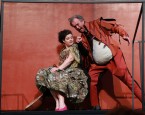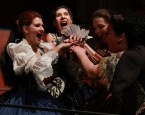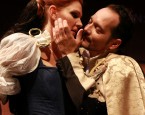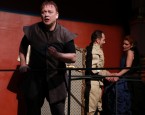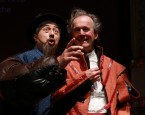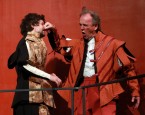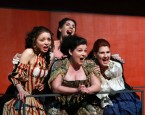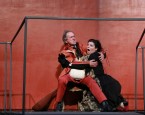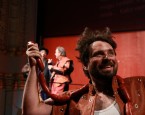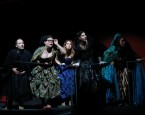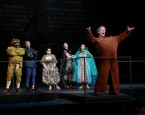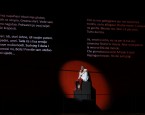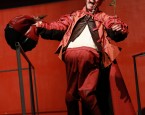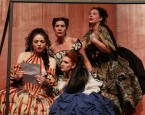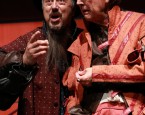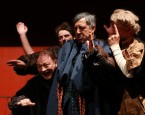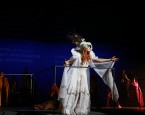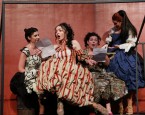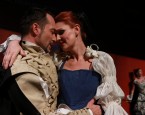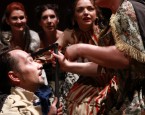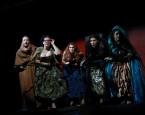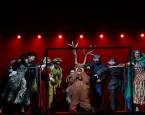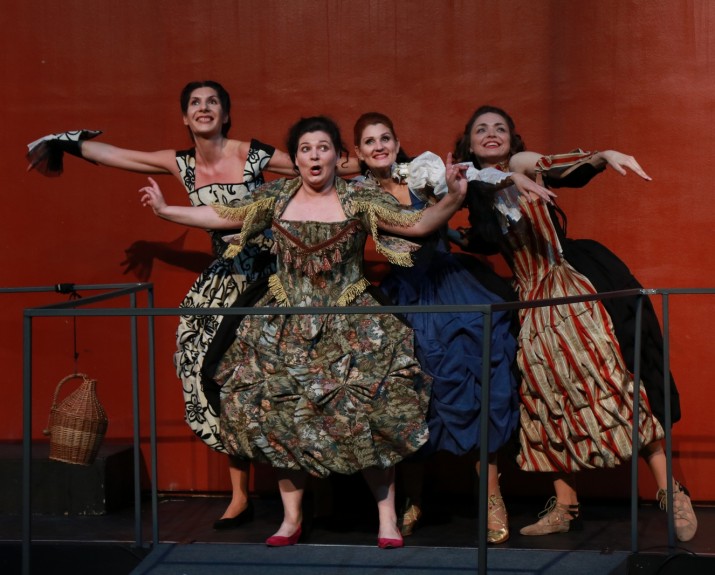
FALSTAFFGiuseppe Verdi
In his, already recognisable director’s stamp «Less is more», Blažević has decided again on the reduction of the stage and as stage designer, next to Dalibor Laginja, he brought this work and its participants in front of the curtain, into the first row of the stalls, among the audience at the front and the back, slipping in himself in some situations as a helping «civilian», which brightened up the developments still more, occasionally at the verge of filigree like woven commedia dell’arte, especially so in the witty costumes by Sandra Dekanić. A special flavour was added by the two-language text with occasional sarcastic comments shown on an enlarged display, another point for the directing imagination that Marin Blažević obviously does not lack.
(…)
The ensemble of revengeful and resourceful Windsor ladies, their husbands and lovers, servants, an eager judge and, of course, Falstaff, sweat heavily in the stage movement by Selma Banich, going round in the selected space in all the directions of humour and spirit emerging from the music and making it so special. In the female quartet it was Anamarija Knego as Alice Ford that lead with her musicality, though not less impressive were also Ivana Srbljan as Meg Page, a beautiful lyric Nanetta by Vanja Zelčić and a very funny Miss Quickly by Biljana Kovač, while the male part, besides Surian, was led by the excellent Robert Kolar as Ford, next to him all of them very good, Aljaž Farasin, Sergej Kiselev, Marko Fortunato and Dario Bercich. All of them had a great time, which is possible in such an opera only if all the vocal passages have been impeccably acquired.
The conductor Ville Matvejeff is responsible for them as well as for the top-grade sound of the orchestra and a smaller part of the chorus, having undertaken this, after Otello, the penultimate Verdi opera, the last, possibly also the most difficult one.
Jagoda Martinčević, Jutarnji list
What was insisted upon is the quality of each individual interpreter – all soloists were in their roles through and through, natural and uninhibited in their characters, as singers in such a form that it was with ease that they could render all the nuances of the comedy. The entire style of the performance was straightforward and close to the audience – from introducing the audience into the performance, when the soloists welcomed the audience before the very first bars of music and with lights on in the auditorium, up to the final moments of the performance when some performers were singing from the audience.
Surian is masterful in interpreting the character that wins and loses with the same ease and benevolence; when eventually realising that he had been defeated he regenerates again leading the final fugue Tutto nel mondo è burla – All the world’s a joke.
Zrinka Matić, Klasika.hr
Running time:
The performance lasts 3 hours, including two intervals after Act II and Act III.
Opera sung in Italian, surtitles in Croatian.



